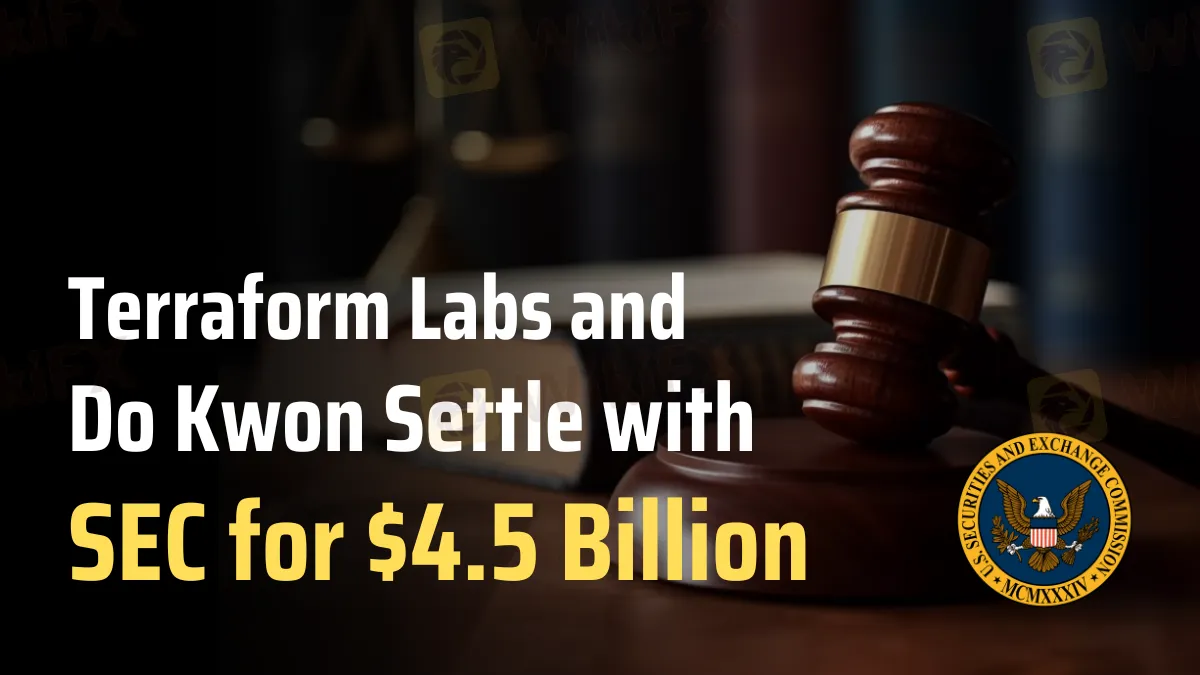简体中文
繁體中文
English
Pусский
日本語
ภาษาไทย
Tiếng Việt
Bahasa Indonesia
Español
हिन्दी
Filippiiniläinen
Français
Deutsch
Português
Türkçe
한국어
العربية
Terraform Labs and Do Kwon Settle with SEC for $4.5 Billion
Abstract:Terraform Labs and Do Kwon have agreed to a $4.5 billion settlement with the SEC, resolving fraud allegations related to the Terra ecosystem collapse.

The U.S. Securities and Exchange Commission (SEC) and Do Kwon, the co-founder of Terraform Labs, have struck a significant settlement on fraud claims. This deal comes after the disastrous Terra ecosystem collapse, which cost investors $40 billion.
Terraform Labs must pay around $4.47 billion as part of the settlement, which was made public in a court document on Wednesday. This amount comprises around $467 million in prejudgment interest, a civil penalty of $420 million, and disgorgement penalties of almost $3.6 billion. Individually, Do Kwon must pay $110 million in disgorgement penalties and about $14.3 million in prejudgment interest.
An investor-fraudulent trial in New York concluded that Terraform Labs and Kwon had misled investors about the security of the Terra USD (UST) stablecoin and the capabilities of its blockchain technology. Based on evidence that investors were duped into spending over $2 billion on UST because they thought it would be a secure investment, the judgment was rendered.

Kwon has 30 days after the final judgment to deposit $4.7 million into an escrow account under the conditions of the settlement. Kwon's PYTH token holdings and the Luna Foundation Guard must also be liquidated to pay the penalties and interest owed. The civil penalty penalties will be applied to any excess from these transactions.
Numerous international enforcement organizations filed a lawsuit against Kwon and Terraform Labs, which the SEC has now settled.
When the SEC first proposed the penalty, it was set at $5.3 billion, the highest amount ever levied on a cryptocurrency enterprise. However, considering Kwon's large profits from Terraform's actions before the company's bankruptcy, the SEC justified the final figure as “conservative” yet “reasonable.”
Kwon is now free on bail in Montenegro and might be extradited to South Korea or the United States, where he would be prosecuted on further counts. The collapse of the Terra ecosystem in May 2022 made ripples in the cryptocurrency space and brought attention to the dangers that algorithmic stablecoins entail.
In a similar legal event, a judge in March approved Terraform Labs' use of the money it still had to pay for legal fees. The SEC objected to this choice, mainly because Terraform chose to keep the legal firm Dentons on board. According to the SEC, this measure was taken to safeguard money from potential TerraUSD lawsuit decisions.
The lawsuit that the SEC filed against Terraform Labs and Kwon highlights the agency's continuous attempts to control the quickly developing cryptocurrency industry and holds important participants responsible for misleading actions. The consequences of the breakdown of the Terra ecosystem are still being felt, as Kwon may be subject to extradition and other legal disputes.
You may access the latest news in the crypto market here.

Disclaimer:
The views in this article only represent the author's personal views, and do not constitute investment advice on this platform. This platform does not guarantee the accuracy, completeness and timeliness of the information in the article, and will not be liable for any loss caused by the use of or reliance on the information in the article.
Read more

Georgia Man Charged in Danbury Kidnapping and Crypto Extortion Plot
Georgia man James Schwab charged in Danbury kidnapping tied to $230M crypto heist. Plot targeted couple for ransom after Miami altercation with son.

Bybit Shuts Down NFT Marketplace Amid Crypto Market Downturn
Bybit announces the closure of its NFT marketplace, citing efforts to streamline offerings. Discover the latest trends in the declining NFT market and its shift to utility-based growth.

Galaxy Digital Settles $200M in Luna Token Manipulation Case
Galaxy Digital pays $200M to settle Luna token manipulation probe by NY regulators, linked to TerraUSD’s 2022 crash, impacting crypto market stability.

April Forex Trends: EUR/USD, GBP/USD, USD/JPY, AUD/USD, USD/CAD Insights
Know April’s forex seasonality trends for EUR/USD, GBP/USD, USD/JPY, AUD/USD, and USD/CAD. Historical insights and key levels to watch in 2025.
WikiFX Broker
Latest News
Exposing the Top 5 Scam Brokers of March 2025: A Closer Look by WikiFX
Gold Prices Climb Again – Have Investors Seized the Opportunity?
Webull Launches SMSF Investment Platform with Zero Fees
Australian Regulator Warns of Money Laundering and Fraud Risks in Crypto ATMs
The Withdrawal Trap: How Scam Brokers Lure Victims into Paying More
FCA to Investors: Think Twice Before Trusting These Brokers
Trump\s tariffs: How could they affect the UK and your money
Trump gambles it all on global tariffs he\s wanted for decades
TradingView Brings Live Market Charts to Telegram Users with New Mini App
HTFX Spreads Joy During Eid Charity Event in Jakarta
Currency Calculator








